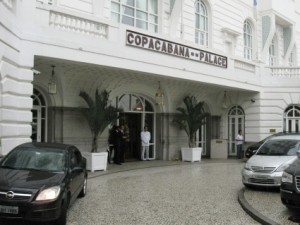
Photo © Michael Sommers.
Although June is a lovely time to visit Rio de Janeiro, don’t think of going near the Cidade Maravilhosa this year – at least between the 13th and the 22rd.The reason to steer clear of Rio is that the city is hosting the United Nations’ Summit on Sustainable Development (known as Rio + 20 in homage of the landmark Earth Summit that took place in the city in 1992). Of course, it’s normal that such a high profile event, expected to draw around 50,000 participants from around the world, would make it challenging for mere tourists to find accommodations.
However, “challenging” turns out to be an understatement – try impossible.
“High season” is now a year-round phenomenon.It used to be that Rio had a “low season” (marked by low vacancies and discount rates) and a “high season” (in which vacancies dried up and prices escalated). However, in the last couple of years, the city has boomed as a tourist destination while drawing a slew of business travelers lured by its expanding oil, financial, and IT sectors. As a consequence, “high season” is now a year-round phenomenon.
There has been much talk about plans to build new hotels and expand pre-existing ones ever since 2007, when Rio pulled off the double whammy of winning hosting duties of both the 2014 World Cup and the 2016 Summer Olympics. However, despite all the great intentions, to date, not much has happened. Even a recent post on the site of the Investment Promotion Agency of Rio de Janeiro admits the current situation is “critical”. Indeed, plans to construct 85 hotels – which will add 10,000 rooms the current total of 30,000 – are woefully behind. Only with a lot of luck, will they all be ready (as promised) for the arrival of the Olympic torch.
While these major sporting events are still years away, the Economic Summit is already looming. To their credit, savvy Brazilian government officials took precautions months ago. Worried about the lack of accommodations, they went ahead and booked up 80 percent of the city’s hotel rooms so that 123 government delegations and 80 heads-of-state from around the world would be assured of having a place to lay their heads.
The problem, however, is at what price. Last week, an online search carried out by Reuters found that a room in a Copacabana hotel, which would ordinarily cost R$431 (US$220), was being advertised for a rate of R$2,263 (US$ 1,155) during the summit.
Faced with such flagrant gouging across the board, it’s no wonder that many participants are not only put out, but putting off flying down to Rio altogether. The European Parliament, for example, recently downsized its delegation from 11 people to one while Japan trimmed its delegation from 500 to 400.
Meanwhile, even if they’re willing to foot enormous bills, it’s unlikely that non-government participants and demonstrators – not to mention unsuspecting tourists – will even be able to scrounge up an empty bed. When Reuters carried out an online search for available rooms on Thursday, it found only one out of 135 listed hotels that boasted a vacancy, and this lone property was located far from the city’s downtown and beach neighborhoods.
As it is, things are so tight, that some of the delegates won’t even be staying in Rio, but in neighboring cities such as Niterói, Petrópolis, and even Angra dos Reis (which at a distance of 155 km (96 miles) stretches the definition of “neighbor”). As recently as March, mayor Eduardo Paes was contemplating launching an emergency campaign in which he called upon citizens of Rio to open up their homes to summit participants. Certainly, it’s only by relying on the kindness of Cariocas that unwitting travelers will be able to stay in the city during this period.
Update: On May 16, as a result of negative press coverage regarding price gouging and concern over so many international attendees opting out of a conference of such historic significance, the Brazilian government intervened to check exorbitant prices. In a meeting with the Rio chapter of the Brazilian Hotel Industry Association (ABIH) and Terramar, the agency responsible for the bookings, an agreement was established whereby the agency’s commissions will be paid by the hotels instead of guests and hotels will offer discounts and cancel packages by which delegates were obliged to pay for minimum stays of several days.